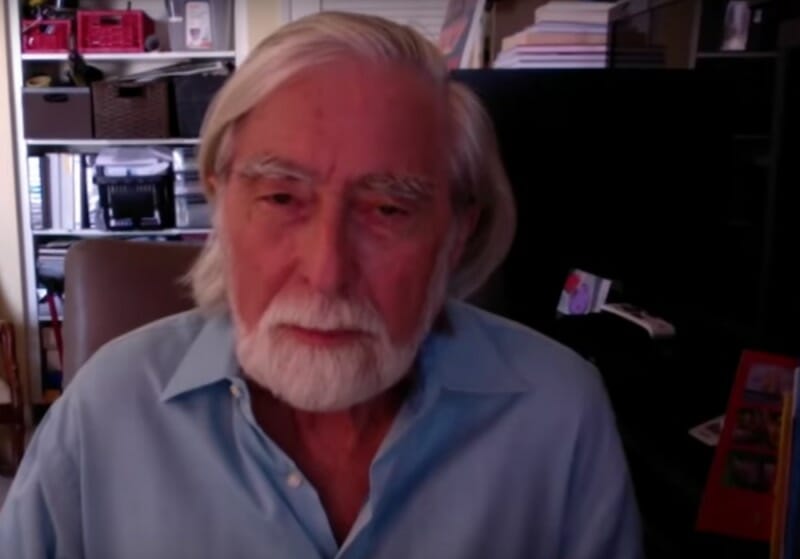Robert Scheer: Bezos and Amazon Team Up With Defense, CIA, ICE
Truthdig's editor in chief reveals how Amazon and the data mining firm Palantir help ICE hunt down immigrants, pick out the innocent as potential criminals and build the cloud for the government.
Editor’s note: This video and full transcript is from a conversation Friday between the Real News Network’s Marc Steiner and Robert Scheer, Truthdig’s editor in chief.
MARC STEINER: Welcome to the Real News Network. I’m Marc Steiner. Great to have you with us.
Amazon CEO chief Jeff Bezos has been in the news for quite a while now for many reasons: becoming the world’s richest man, giving a $2 billion gift to build schools and help the homeless, buying the Washington Post. Most recently we saw the result of his being hounded by Senator Bernie Sanders and Congressman Ro Khanna over working conditions and salaries of Amazon employees, which prompted Bezos to give his workers a raise to $15 an hour.
Most these stories are important and vital, but there’s one story that seems to have fallen through the cracks and has not been given the same kind of media attention. And that’s the close working relationship between Amazon, the Department of Defense, CIA, Immigration and Customs Enforcement, or as we know it, ICE, local law enforcement, and the secretive data mining firm Palantir. It appears that the intertwined relationship ominously involves the intersection of mass surveillance and military contracts. At Wired’s 25th anniversary celebration last week, Jeff Bezos defended Amazon’s contracting with the Department of Defense, being very clear that he won’t be intimidated like other Silicon Valley tech companies whose employees are protesting their company’s involvement in the advancement of war and their role in increased mass surveillance.
My guest today is Robert Scheer, who wrote the book “They Know Everything About You: How Data Collection Operations and Snooping Government Agencies are Destroying Democracy.” He’s also the host of the podcast Scheer Intelligence, hosted by the local NPR station KCRW in LA, and is the editor in chief of Truthdig.com. And once again, great to have you with us. Thank you for joining us, Bob.
So let’s just begin here. Your book seems a little prescient, almost, really prescient, about discussing the relationship we’re talking about today. So let’s start—let’s go back. Let’s talk about Palantir. Who are they? What do we know about them? I mean, it seems like it was founded with the help of the CIA, and Amazon’s $600 million contract several years back, with the CIA’s cloud-based computing system, and more. But just who are they? And why are they so important in this equation?
ROBERT SCHEER: Well, first of all, understand that the key, as George Orwell pointed out, and others have, that our own Constitution points out, if you don’t have private space, if you can’t be alone with your thoughts, your associations, your books and so forth, you can’t have freedom. That’s the bottom line. The American Revolution was fought over that. And the Internet represents, yes, the best and the worst of worlds. We are connected. We offer a lot of ourselves. We learn a lot from it. But it’s also the worst in terms of individual space and privacy. This has come to be recognized particularly after Edward Snowden revealed the extent of cooperation between companies like Facebook and Google and Apple, and others, and the intelligence agencies and government. The Defense Department, the CIA, the NSA, and so forth.
So before Snowden’s revelations, it was possible to minimize all of that. And these companies would say, hey, we’re private enterprises. You’re voluntarily giving over your data. And this is no threat to your freedom, we’re just helping you be better shoppers. Well, what Snowden revealed is this data was given or stolen by- when Apple and Google didn’t cooperate, the NSA and CIA just cut into their cables, went through backdoor access to their computers, and gathered up the most intimate details of your life. In the case of Amazon, for example, not only what books you bought, but how far you read in that book. What you wrote to friends about what you thought about that, or the movie you saw, or what have you. Your most private thoughts.
So then you have the 1984 world, where a government anywhere- and by the way, they service governments all over the world. Other governments can do it, can get information about what you are thinking, who you are associating with. And you end up in, basically, an unfree, untenable situation from a point of view of freedom.
Now, the key to all this is that these businesses primarily- certainly in the case of Google and Facebook, but very much so with Amazon- are making their money not from servicing the clients as the customers. Amazon really didn’t make, in terms of its sales, most of his profit does not come from supplying you with detergent, or books, or music, or videos, or anything else. It comes from being able to mine that data, to advertise you. That’s why in Google you don’t even pay for the service. Facebook you don’t pay. The key thing here is your data. The most detailed, personal, intimate data is the thing really being sought and marketed. It’s being mined, OK.
Now, as long as that stays in the private sector, you can argue that’s not the business of our Constitution. But when the government gets access to that information, and when the government and the private sector are commingled, as they are very intimately with Amazon, for example, then you have a situation that fundamentally threatens a free society. And when I say intimately connected- and I think that’s why Jeff Bezos made that outrageous statement that, you know, I’m just being a patriotic person, and Amazon is going to help the government be strong. Well, that’s hogwash. Because really what he is is a major defense contractor. The very kind of person that General Eisenhower warned against when he talked about the military-industrial complex. You now have to add intelligence agencies.
And Amazon, one of their sources of profit, main sources, is building the cloud and doing Amazon Web Services. If you look at the profit picture, just today they’re announcing yet another billion-plus quarter; four times greater than it was last year. That’s not coming from selling you products on Amazon. What they’re gathering is your data. That’s coming from their building this whole web infrastructure of data seeking. And Amazon has been building the main cloud for the intelligence agencies. All right? They are collecting it. All this data that the government gets access to and so forth, most of that is going through Amazon-run enterprises. So no wonder Jeff Bezos is nervous about people focusing on that, because he’s in fact primarily, at this point, a military contractor.
MS: So let me ask you a question, Bob. How does this group Palantir, founded by Peter Thiel, a close ally of Trump’s, fit into all of this? I mean, this is a man who named his company after the all-seeing eye in the Lord of the Rings that was being done by the evil wizard Saruman. I mean, so who is he, and how does he fit into this? How does his company fit into this? What’s their role in all this?
RS: First of all, it’s very interesting this connection between the private and the public, OK. They all claim to be public companies with just brilliant Silicon Valley software engineers, and we develop these great products. But you know, we know that Google itself, the whole Internet itself, came out of a DARPA, Defense Advanced Research Project. You know, the Defense Department was developing communication in the event of a nuclear war. That’s where we got the web from, as a side product of defense spending. The association with many of these companies, most of them in the defense industry, the intelligence community, is long-standing.
But in the case of Palantir, that’s a company that during its first three years, started by venture capitalists and others in Silicon Valley, including Peter Thiel from PayPal and so forth, using the technology of PayPal, learning so much about how we manage our data and our finances. Their only client- first of all, one of their investors was the CIA, through a dummy CIA corporation called In-Q-Tel. And In-Q-Tel was created by the CIA in order to get the brains of Silicon Valley to help them figure out the Internet and everything, and how to use it for their purposes.
Now, the CIA is still under congressional restriction not to be spying on American citizens, Americans. They’re supposed to be doing this internationally. It’s the FBI that’s supposed to be monitoring us. But not the CIA. Nonetheless, the CIA developed a company called In-Q-Tel and invested in a plethora of Silicon Valley companies. One of the companies they invested in was Palantir, a really mysterious, still-private organization. A huge company, incredibly profitable. And Palantir, like Amazon, has been involved in advising the government and working with the government during their first three years of existence. The CIA was their only client. Now Palantir is tied into all of the intelligence agencies. And Palantir is even more blatant than what Amazon is involved with. Palantir is actively involved in police activity, domestic police activity, throughout the country in about 70 different police outfits.
And here in Los Angeles, for example, we have a very active coalition, community coalition, Stop Police Spying. And what they’ve been able to discover is that there is this ominous predictive policing program that is nationwide, which came out of 9/11. It came out of supposedly finding terrorists. But the terrorists they’re finding are ordinary people who live in our community. And they’re finding, predicting that they’re going to be criminal even if they haven’t. Even a past record of being criminal. They find them.
Palantir is working within these police stations. They’re not alone developing these models of predictive policing, which is a way of defining who among us are likely to commit crimes, and based on the data they’ve collected about us. That data and the algorithms are not made public to us. They are not subject to discussion. The city council, people who control their activities, are really not privy to how they do this. And yet the police target certain neighborhoods, certain individuals, based on those algorithms. Based on the data that Palantir supplies to them.
So what Palantir is an example of, and the same thing at Amazon, is the wedding of a domestic police agency, domestic police force, with a notion of international power and our defense contractors, our CIA, our NSA, and so forth. So we have the brave new world that Huxley and the 1984 world that Huxley and Orwell warned us about. We have this constant observation of our people, and we have some who are part of big corporations making this enormous amount of money. As you know, Jeff Bezos of Amazon is now the richest man in the world. And they are making money by being in bed with with our intelligence agencies.
MS: Describe for us what’s happening now. What is this latest news coming out that we’re not covering very much in the media about Bezos, Amazon, the Department of Defense? I mean, his employees himself have been trying to get him to to not put Palantir in that cloud. He won’t listen to them. He’s going to do what he wants to do. But what is this latest revelation about?
RS: Well, one of the big revelations is about facial recognition technology and their use of it. And again, it goes back to the basic point. A company like Amazon has much more information on us, our face, the pupils of our eyes, everything about us. Our most intimate habits, our travel, everything. And all this information that no secret police agency in the world could ever fantasize about; ever fantasize. When our own FBI went out to destroy Martin Luther King, something they don’t teach about much in the schools, when they went out to destroy Martin Luther King they had to use crude, old-fashioned measures. They had to actually follow him, or get a hotel room next to his hotel, and then tap into his old-fashioned phone line, or so forth.
None of that is necessary now. Anywhere in the world, any dictator, any government in the world can now use our marketing services, our commercial- Facebook, Google, and Amazon to gather an incredible amount of detail about everything you do in your life. When that information is made available to the government, and when they are partners- mind you, Amazon is a partner with NSA, CIA, the FBI. All of these organizations are developing their data storage area. OK? And when they’re partners with them, and they themselves, these groups like Amazon have all this information, you have a violation basically of the constitutional protection and our Fourth Amendment to our privacy. Our right to not have our effects, our books, everything, our papers surveilled. They can’t come through your door. They must have a specific warrant. All thrown out by this new technology.
And that is really a fundamental violation of our Constitution. And there’s almost no examination of it. And what Bezos is saying is trust us, give us a pass. We’re always going to go after the bad guys, we’re never going to go after the good guys. And that is the basis of a totalitarian society.
MS: So as we conclude here, Amazon’s developed this recognition, which we can talk about here, what it does. You’ve covered this on your podcast. And given what is really at foot here and moving, which is the relationship between Silicon Valley, Amazon, Palantir and the rest, with a deal with the Department of Defense, the CIA, ICE, the FBI, all this surveillance, I’m curious. In all your years as a political activist and journalist, what should be the- how do you respond to that? I mean, it’s one thing for us to talk about this, which we need to do to give people an awareness of what’s going on. But there also has to be a response, and not just throw up our hands and, oh, we’re done.
RS: Well, the response that I could- you can take the leadership from the European Union, because there’s a lot more pushback in Europe than there’s been here. And all of these high tech people- Tim Cook went there from Apple and pledged just this week that he would be concerned more about privacy, and that Apple cares, Google, and so forth. And the only reason these companies might do the right thing at times is when they’re worried that their business model will be hurt. If consumers don’t trust them, if they think they’re being spied on, if they’re aware. That could hurt, you know. Facebook could be less popular. After all, Facebook has been accused of having given 50 million accounts to a questionable group that was gaming the last election- without any Russian interference, I might point out.
So then people stop using, are wary of these services. So that has happened more. And we’re much more gullible in this country. I know, I teach in a university. And my students think, well, this is just for their convenience. Oh, I was looking at shoes. I talked to a friend and suddenly shoe ads appear all around me. OK, well, the same people who can target you for you are shoe ads can also target you for your politics, your reading habits, what movies you like, what political organization you belong to, your free speech. They could put you on a predictive policing list, to say watch that person, OK. Let’s check them out even more closely. And then you have a surveillance society.
Now, the defense some of my students will say, and the defense given by Silicon Valley before Mark Zuckerberg and others don’t do anything, Eric Schmidt from Google, don’t do anything that will give government reason to go after you. But most people in the world know that governments cannot be trusted. After all, the assumption of the American Constitution is that the government is potentially your most dangerous enemy. That’s what George Washington, Madison, Jefferson, all of them warned us against. You know, George Washington warned about the impostures of pretended patriotism. He was a general, just like Eisenhower. So the whole construction of the American Constitution is to protect us against our own government.
Now we have a situation where private corporations, ostensibly, gather your most intimate data that no secret police would have ever been able to get- everything about you. Your eye scan, your facial recognition, where you’ve been, where you shop. You know, you give your location all the time, right. And so they can spot you be there, be there. What do you read, what did you write to your friends, what are you thinking, and so forth. And they develop a profile of you, and then you become a target of the surveillance society. And it’s a self-fulfilling prophecy.
So maybe you’re a critic of Amazon, as I’m being right now. Or you’re a critic of Palantir. Do I end up here- I’m in Los Angeles. Palantir is advising my local police department. Do they then say, hey, watch this guy Bob Scheer? You know, put a special check on him?
MS: They might.
RS: That’s what’s built into this. That’s what’s predictive policing is about. And you know, first they go after people that have a little bit different idea, a little bit critical. And then you suddenly find everyone in the society that’s concerned. You know, it’s it’s a fundamental issue.
Now, I’ll tell you the great contradiction. As the great singer-poet Leonard Cohen said, there’s a crack in everything, that’s how the light gets through. If you want to be optimistic, and you talked about organizing, the big problem for these multinational corporations is they have to have customers all over the world. If they’re in bed with their own local government, their own government- the U.S. government- believe it or not, most people in the world recognize that’s a separate government. It’s not a world government. It’s not universally trusted. So you have, you know, should people in China be demanding that Google, which has been blocked in China, come in now? Well, they’ve got four huge Internet-related companies of their own. And people might say, hey, better the devil we know than the devil we don’t.
And so the whole problem is if you want to be a multinational corporation, you have to protect the interest of your customers, or your people you’re dealing with all over the world. And when this stuff gets known, is exposed- that’s why Bezos is pushing back. Because other people might say, hey, if Amazon is locked in with the American defense industry, do we want Amazon in Europe? Do we want Amazon in China? Do we want Amazon elsewhere? They’ll push back. And maybe people in the United States say, wait a minute. I’m buying, you know, 50 Shades of Grey, this movie. Do I really want people and the government and everywhere else to know that I bought that book, and how far I read in that book, and what I wrote to my friend?
Suddenly privacy is what it is. This becomes very personal. And why is this guy Jeff Bezos, who’s making this enormous amount of money, so sanguine about selling and giving my privacy away? Which is why he’s in the business of doing, with targeted advertising, and then this intense cooperation with government. It’s very suspicious that he should now say, you know, get over it. If my employees or anybody else wants to raise questions about my relation with the government, they’re out of here. Well, that’s not what the Constitution is about. Our Constitution says we’re supposed to be suspicious of our government. We’re supposed to be worrying about power corrupting, and absolute power corrupts absolutely. We’re supposed to be- that’s why we have a First Amendment, OK. We’re supposed to be guarding against government overreach, government excess, government surveillance. That’s what the American Revolution was fought about against the Brits; you know, breaking into your homes.
And here’s Jeff Bezos saying, hey, get over it. I sell you products, they deliver every day. And the other issue is he doesn’t want people in the community raising questions, as Bernie Sanders did very effectively, about who’s delivering these goods. You know, what’s replaced brick and mortar stores? What are the working conditions? Well then, do you get branded as a suspicious person if you are organizing against Amazon? Are you, then, the enemy? Do they then tell their friends in the NSA, FBI and everything, watch those folks over there, they fit our predictive policing profile of a terrorist or a criminal? That’s the danger.
MS: Well, Bob Scheer, it’s always a pleasure to talk with you, and getting your insightful analysis on the air here with us. I deeply appreciate your time. Thank you so much. Bob Scheer has been our guest, and I’m Marc Steiner here for The Real News Network. Thanks for being with us. Take care.
Your support matters…Independent journalism is under threat and overshadowed by heavily funded mainstream media.
You can help level the playing field. Become a member.
Your tax-deductible contribution keeps us digging beneath the headlines to give you thought-provoking, investigative reporting and analysis that unearths what's really happening- without compromise.
Give today to support our courageous, independent journalists.





